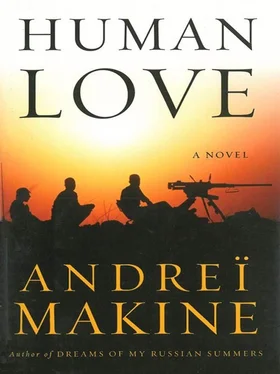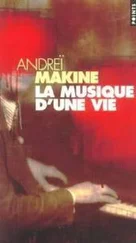Now inside a little room with yellow walls there was a black woman seated on the bed. Naked and motionless, very upright. In front of her a man was hopping about angrily. The top half of his body was already undressed and he was struggling with his pants, in which one of his legs had become entangled. His face was very tanned, as were his neck and hands, but his chest and belly appeared white and crumpled. He was performing his leaping dance, hissing oaths. “Like a monkey” Elias reflected later, while observing that it was generally black people who attracted the comparison. At the time he had been incapable of thought, of understanding. He stared at the motionless woman who resembled a statue of smooth, black wood. She was not looking at the man tangled up in his clothing, nor at the walls of the room, nor the window. Her eyes saw what no one else could see. She did not smile. And her beauty obliterated the rest of the world.
The man finally freed himself of his pants, stood up, naked on his short bowlegs. Hideous. Went up to the woman, seized her by the forearms, thrust her back onto the bed…
The window slipped slowly upward. Elias felt his feet sinking into the cool mud, up to his ankles, over his ankles. The bird flew off from his shoulder, disappeared among the piles. A boat passed on the river, the voices sounded very close, other voices rang out in response, coming from the shore. The beams of electric flashlights sliced through the darkness. Footsteps squelched rapidly like suction pumps on the clay of the riverbank.
He ran, fell, hid, noticing his shadow projected by a flashlight onto a wall, a bush. The frontier of the shanty-town was very close. He crossed it and collapsed behind a cob wall. In the distance gunshots pierced the night; then silence enveloped him, all he could hear was the beating of his own heart, which corresponded strangely to the rhythmic glittering of the stars above his head.
In the morning he observed his mother and saw nothing that looked like that black wooden statue in the yellow room. Only her gaze, perhaps, which sometimes plumbed an abyss other people were unaware of.
He lived through the days that followed in the feverish hope of plunging his face into the warm and tender crook of that arm and thus forgetting all he had seen, causing the building on piles and the hopping man-monkey to vanish.
But hardly a week later a friend of his fathers came to see them with a message. From the whispering of the adults Elias learned that Lumumba was dead, his father was on the run, and above all, that they must escape from Dondo as fast as possible.
The warning was late in coming. The next evening, on his return from fishing, Elias found their shack empty The police had arrested his mother in a street in the city.
For a time his mothers footprints would remain visible in the powdery earth around their house. He would walk with extra care so as not to erase them. Then a shower of rain came and obliterated every trace.
THE TRICK WAS TO WALK INTO THE CITY of the whites carrying an old birdcage. He had found it on a garbage dump and repaired it with strips of bamboo. The police finally got used to the sight of this young black who, when questioned, would reply: “Senhor Oliveira has told me to take his bird to the vet.”
He walked past the shopping arcades, the Post Office building, and, hidden behind a tree, began watching the entrance to the prison. At nightfall, when passersby were few and far between, he climbed into the fork made by two huge branches, hung his birdcage amid the foliage, and froze, his gaze hypnotized by the dense crowd behind the high enclosure.
“So human beings can be killed without being deprived of life,” thought Elias, observing this mass of bodies, mea-gerly covered in rags. No need to drain them of their blood, to dismember them. It was sufficient to starve them, throw women and men, old and young, all in together, make them perform their functions in the presence of the others, keep them from washing, forbid them to speak. In fact, to eliminate every sign of their belonging to the human race. A corpse was more alive than them, for a dead man can still be recognized as a man.
The indistinct mass of people moved slowly, trickling across from one wall of the courtyard to the other. If his mother had appeared at that moment, alone, separate from the cluster of bodies, if he had recognized her, he would have ceased to exist, burned to a cinder with grief. He would have become the cracked base of the tree, the great round stone he put his foot on to climb up… Fortunately distance transformed the prisoners into a lava of anonymous cells. And yet this was all he hoped for: to see his mother again.
One evening he again collided with the unstable borderline of life. He ventured as far as the prison gates and through the railings saw a man lying in the courtyard. Still alive, for his arms moved occasionally, his hands slipping slowly across his body As if he were trying to ascertain on his bare skin the state of the wounds glistening under a restless crowd of insects. Worse than death, thought Elias, sensing in his own body, on his own skin, the fire of that swarming death agony. And he told himself he could not have lived for a moment with such vermin-infested wounds.
The sight of that body corroded by decay turned him into a somnambulist; he wandered away from the railings, picked up his birdcage, began walking slowly, mechanically He no longer noticed the passersby, did not seek to avoid the patrols. As vividly as one hallucinating, he pictured his mother beside that half naked man, his dark wounds buzzing with flies. And told himself that there must surely be a place somewhere on earth where his mother and that prisoner could have taken refuge to keep their sufferings at bay, if only for the duration of a sigh. There must be a being who would have offered them shelter.
At that hour, Dondo Cathedral, massive as a fortress, was empty and silent. Elias heard the echo of his own footfalls on the paved floor, and even, it seemed to him, the beating of his own heart, amplified by the height of the nave. So polished was the gilding on the statue of the Virgin that it appeared translucent. He had difficulty in making out the expression on the face amid this glitter, peered at the lowered eyelids, the tartly closed lips…
He prayed like a child who had never learned to pray. Only this vision was put into words: “I want my mother to be sitting there in the doorway of our house in the evening. I want to hide my face in the crook of her arm.” The words, haltingly whispered, sought to convey this to the statue of the woman with lowered eyelids and tart lips. He had once seen a film in a cinema in Luanda, in which a man’s prayer was granted. It happened in books, as well, he knew.
The priest’s shout was terse and harsh. Elias jumped to his feet and ran toward the exit, his head bowed to avoid a second blow from the stick. Father Anibal’s cane thumped on the paving stones with an angry clatter that accompanied the fugitive all the way to the creaking of the great door.
Father Anibal was not a hard man. He was quite simply frightened. At this hour each day he passed through the cathedral on his way to meditate in his big presbytery garden. He had already been deep in his reverie when this young black jumped up in front of him. Furthermore, even before taking fright, the priest had sensed an anguished intensity within the empty space of the building, an unaccustomed density amid that air laden with silent prayers, whether ancient or recent. He knew what people generally asked heaven for. On this occasion there was a difference in the vibration left by the unspoken words. And yet the cathedral was empty. He had taken several steps and then stumbled, knocking over a large basket. No, a birdcage! Strident trilling, wings flapping, and above all, the abrupt movements of this skinny black youth, whom he had at first taken for a lurking dog. He struck out and swore in order to conceal his fear… Once he was settled in his garden, his thoughts returned uneasily to the extraordinary tension he had sensed in the nave just now. The bond uniting the one who prays with the one who receives the prayer. And he, the priest, the confidant of both. In his youth he had truly believed in this… This evening he did not know what troubled his meditation more – the loss of his faith, eroded over the years by contact with the stupidity and cruelty of human beings, or the face of that child running away with his birdcage under his arm.
Читать дальше









